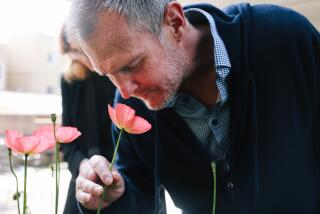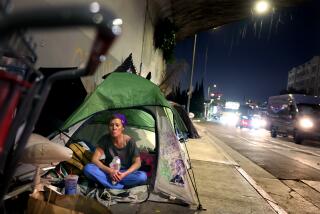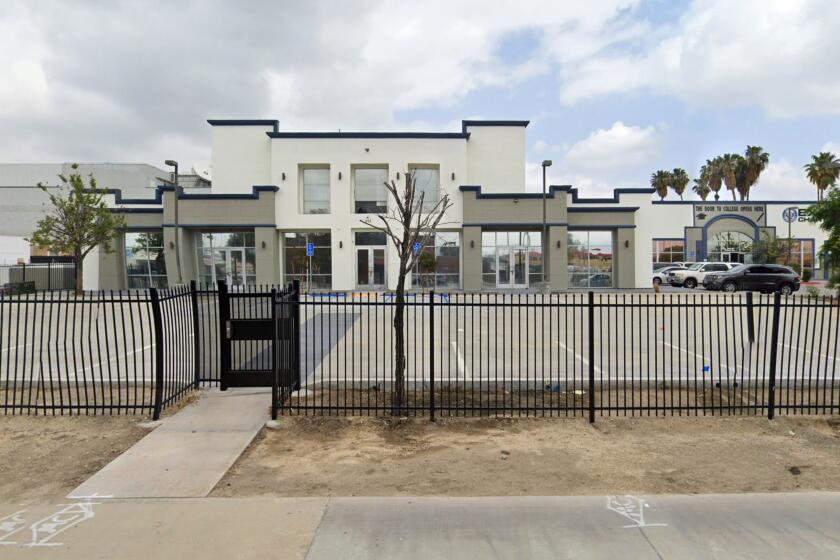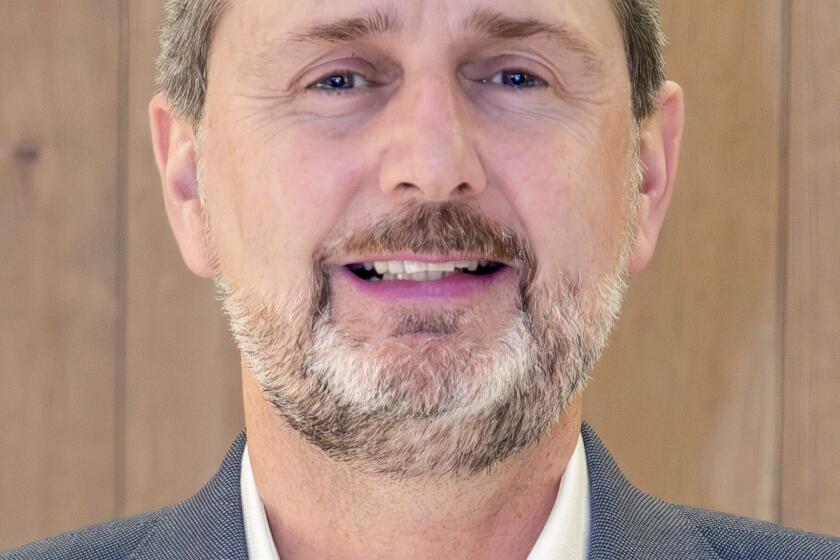Arson suspect took a twisted path to Los Angeles
Reporting from Los Angeles and Vancouver, Canada -- Once Dorothee Burkhart had squeezed through a window and escaped, only two things mattered: Finding Harry and getting out of Germany.
It was September 2007 in Frankfurt. Four months earlier, police had arrested Burkhart in a string of thefts and sent her to a woman’s prison to await trial. Separated from Harry, her 19-year-old son who suffered from a slew of mental disabilities, she had grown increasingly anxious. Without her, Harry was alone and unprotected in a city that she believed was filled with people set on hurting them.
So, when Burkhart developed chest pains in prison, she didn’t resist being brought to a nearby hospital, she later told authorities in an account of the escape. When left alone and uncuffed in a bathroom, Burkhart squeezed through a tiny window and ran to a nearby train station. Once safely away, she called Harry and told him to come with their passports and cash. They drove to Amsterdam and boarded a plane, landing 5,000 miles away in Vancouver, Canada.
It was the start of a journey by a mother and her son that came to a calamitous end this week in Los Angeles, when Harry was arrested and charged with setting ablaze dozens of vehicles and a few buildings in a four-night arson rampage that set the city on edge. The fires, investigators say, were a son’s twisted, angry response to seeing his mother captured by federal authorities intent on extraditing her back to Germany.
Indeed, as investigators have begun to unravel the Burkharts’ tightly intertwined lives, they have happened upon a story perhaps more incredible than the fires themselves. It’s a tale of massage parlors, small-time con games, neo-Nazi conspiracies, and investigations into mysterious fires set in three countries.
With much of the details coming from Dorothee and Harry themselves — in volumes of convoluted testimony filed in a failed attempt to gain political asylum in Canada — it is harder yet to know where truth blurs into fiction.
Those who encountered them along the way describe a quiet, introverted child-like man who kept largely to himself and depended heavily on a mother who swung unpredictably between pleasant and nasty.
“They were somehow like one, that one could not exist without the other, all they had was the other one,” said Michael Koch, Dorothee Burkhart’s court-appointed attorney in Germany, who spoke with Harry after his mother’s arrest. “He was like in the cloud, he was looking to my face but his eyes were running from left to right. His questions were not really connected with what I said before. His question was: ‘When will my mother come out?’”
Their story began in Grozny, the capital of Chechnya in the former Soviet Union, where Harry was born in July 1987. His parents never married and Dorothee told Canadian officials she raised Harry and an older daughter by herself. According to court filings, Dorothee recognized early on that her son didn’t behave like a typical child and likely had some type of mental disability. He was 7 in 1994, when Russian forces laid siege to the city to put down a Chechen push for autonomy. The brutal fighting claimed tens of thousands of lives, mostly civilians.
Dorothee and the two children fled to Germany, a nation that gave refuge to many victims of the Russian crackdown. They settled in Frankfurt and received citizenship after showing German ancestry. Burkhart made her living driving taxis and in real estate dealings that, for a while at least, were legitimate, according to Canadian and German court records. Eventually, however, she turned to scamming tenants and landlords, racking up at least $35,000 in misbegotten proceeds over several years, according to charges filed by German prosecutors. Along the way in 2004, she deceived a Frankfurt plastic surgeon into believing she had made a nearly $10,000 bank transfer for breast enhancement surgery, German officials say.
Early on, there were signs of the extremely protective, us-against-the-world relationship that would continue to develop between mother and son over the years. Dorothee clashed often with teachers and school officials who she said were not providing Harry with the special attention and instruction his disabilities required. Educators, in turn, urged her to take Harry to a child psychiatry clinic.
It was during these years in Germany that the conspiracy theories and sense of constant danger that would come to envelope Dorothee and Harry Burkhart’s world took root, court records show. With her daughter living on her own, Dorothee became convinced she and her son were being targeted by their neighbors, police, and most anyone who crossed their path.
It may not have been all imagined. As Russian-born ethnic Germans, the pair’s accents would have given away their origins in a country in which discrimination and harassment of Russians is common. But Dorothee saw something larger than simple bigotry at play. Germans, she believed, were under the control of right wing, neo-Nazi extremists who secretly ran the country.
In 2007, police finally caught up with Burkhart. While in prison, she would later tell Canadian authorities, she was tortured. “At the beginning, the prison guards came at night and took me from my cell to a basement. They would undress me and use electric shock on me. They demanded that I sign a confession to everything I was accused of,” according to a statement in the asylum file.
In his application for refugee status, Harry echoed some of his mother’s accusations. Writing in broken English, he said they were “running away from ‘Democratic’ Germany to safe our life from persecution of fascists in Germany and we have lost everything.”
“Me and my mother, we are among the most vulnerable in society,” he continued in the affidavit. “I’m several disabled, we are alone.... Please help us stay alive.”
The country’s review board and later an appeals court rejected the Burkharts’ request for refugee status and asylum, concluding there was no evidence to support their claims of persecution and abuse.
During the several years it took for the process to run its course, Dorothee and Harry carved out an existence in Vancouver marked by frequent moves from one apartment to another and claims by Dorothee that Canadian immigration officials were plotting against her and her son. Whatever money they had brought from Germany was gone in a few months. They got themselves onto government rolls, according to Lorne Epp, head of a Mennonite organization that operates a well-kept low-income apartment building in which Burkhart and her son occupied two studio units for six months in 2009.
Living in his own apartment, even one that was next door to his mother, seemed too much for Harry. He would place a mattress against the door and sleep on it to keep intruders out, according to court records. A doctor diagnosed him as being on the autism spectrum, suffering from post-traumatic stress disorder, severe anxiety and a sleep disorder, the records show. The same doctor concluded Dorothee was battling post-traumatic stress as well, along with depression and anxiety.
Connecting with the Mennonite community in Vancouver offered a rare sense of refuge for the pair. Some members of the community even signed a letter urging authorities to grant the Burkharts’ refugee petition. Ingrid Schultz, pastor at First United Mennonite Church in Vancouver, said Harry had a “child-like quality about him” and never seemed happier than when he was in the city’s large Stanley Park “just spending time with the ducks.”
It appears that Dorothee and Harry arrived in Los Angeles in late 2010, after they had exhausted their appeals for immigrant status in Vancouver. It was not their first time in the city. They had come in 2007 shortly before Dorothee was arrested in Germany. During the Burkharts’ visit, police responded to a domestic abuse call and investigated allegations that Harry had tried to attack his mother with scissors. No charges were filed.
After the Burkharts arrived in 2010, they disappeared into the large Russian immigrant community in West Hollywood. They rented an apartment for a few months and then moved to side-by-side rooms above a hair salon on Sunset Boulevard, where they lived until their arrests.
Officials believe Dorothee tapped into the city’s illicit sex trade for work, running a sexual-massage parlor out of her room, according to Los Angeles law enforcement sources, who spoke on the condition of anonymity because the case was ongoing. A website listing Dorothee Burkhart as administrator says that a woman named “Annabelle” provides “soul-relaxation massage.” The website lists the address the Burkharts shared on Sunset Boulevard.
Harry, meanwhile, seemed to do little. Several people in the neighborhood recalled a man who dressed in shabby, dark clothing, said little, and came across as aloof.
Many late afternoons, he’d go to the nearby Golden Wheat Bakery, tucked inside an enclave of Russian stores, to eat pirogies and double-layered cream puff pastries, said sales clerk Lucy Bakhtikuan. He never spent more than three dollars at a time and seemed as if he had a hard time focusing, she said.
At some point in 2011, Harry returned to Frankfurt. On Oct. 14, a fire ignited in a house the family owned in the mountains about an hour’s drive north of the city. Investigators quickly determined the fire had been set intentionally and identified Harry as the prime suspect after he submitted an insurance claim in Germany days after.
Harry came back to Los Angeles, where Dorothee took him to the German Consulate to renew his passport. Around that time, federal agents began appearing in their neighborhood, showing photos and asking people for information about Dorothee.
Within weeks she was in custody, facing deportation to Germany to face the fraud charges from several years ago.
At an initial court hearing, Harry erupted in a tirade and was escorted from the courtroom.
That night, the fires began. More than 50 were set over four days on New Year’s Eve weekend, ending after Burkhart’s arrest early Monday.
Authorities in Vancouver now say they are investigating the possibility that Harry was responsible for a series of unsolved arsons there.
At a court hearing last week, apparently unaware of the fires or her son’s arrest, Dorothee pleaded with a judge for information about him.
“The first concern is to be separated from my son,” she told the judge. “He can exist only with me, together.”
Los Angeles Times staff writers Carol J. Williams, Richard Winton, Victoria Kim, Ari Bloomekatz, Paloma Esquivel and Ann M. Simmons in Los Angeles, Paul Richter in Washington and special correspondent Efram Gebreab in Berlin contributed to this report.
More to Read
Start your day right
Sign up for Essential California for news, features and recommendations from the L.A. Times and beyond in your inbox six days a week.
You may occasionally receive promotional content from the Los Angeles Times.







